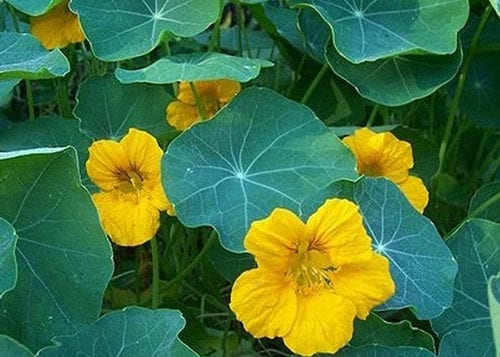Vines and climbing plants can spruce things up
By Ellen Barcel
If you have an ugly fence, a plain wall like the side of a garage or any other flat surface that you want to spruce up, consider vining or climbing plants since they grow up, rather than out. They are also great in hanging baskets, for those with limited space. There are several ways of looking at vines or climbers: annual vs. perennial is one. Another is decorative vs. productive. A third is invasive vs. noninvasive, that is, “the good guys.”
Another consideration is how the plant attaches itself (or doesn’t) to the wall or structure. For example, climbing roses don’t really climb up but grow very tall. You need plant ties to attach the canes to a trellis or other structure. We’ll take a look at a variety of vines, how they grow and what you can do with them.
Annual vines
Annual vines grow up and can be trained up a fence or wall but can also be used in hanging baskets or trailing down a retaining wall depending on the plant.
One of the most popular of annual vines is Ipomoea, a genus filled with over 500 different species and countless varieties. The most popular include the old-fashioned, traditional morning glory which twine around a support. The morning glory flowers (usually blue but there are pink, burgundy and white ones) open up in the morning and close at night while the moonflower (white) opens at night and closes by morning. These are nice mixed together. In that way you have flowers round the clock. Morning glories can reseed themselves for the next season. As a result, they are on Suffolk County’s Management list, meaning they are mildly invasive and it is recommended that they not be planted by county agencies or by homeowners near natural habitats.
Another Ipomoea is the cardinal vine (I. sloteri) which is filled with delicate, red flowers. I. butatas is the sweet potato vine, filled with green or burgundy (depending on variety) leaves. The sweet potato vine is grown primarily for its leaves, but you can occasionally find nonedible sweet potatoes in the soil in the fall. I say nonedible because you don’t know how these plants were treated (what chemicals used, etc.) before you acquired them so the potatoes should not be eaten.
Nasturtium is in the cabbage family and has edible flowers that range in color from pale yellow to bright orange. Nasturtium look beautiful trailing out of a basket, window box or over a retaining wall.
Scarlet runner beans have beautiful red flowers and provide edible beans in fall. One of the cool things you can do with these beans is to create a living tepee for children to play in. The tepee also provides shade in the hot summer for them. Take a set of light-weight poles and tie one end together and stake them in the ground in the form of a tepee. Plant the beans around the outside, leaving a space for an entrance. The beans grow quickly, filling first with the flowers and then the bean pods form.
Hanging geraniums (Pelargonium, not hardy geraniums) are beautiful in a basket. Flower colors range from white to pink and burgundy. Geraniums generally tend to be heat and drought tolerant. This doesn’t mean you can ignore them completely, but they do better in the heat of summer than others. Technically, geraniums are not annuals but are tender perennials, meaning they will die back in our area in the cold but continue to grow in greenhouses or down south, year round. Hanging geraniums will not climb up, like Ipomoea will, since they do not wrap themselves around other plants or have tendrils that wrap around other plants or supports.
Yes, the terminology here is confusing. Hardy geraniums (the genus Geranium) overwinter in our area and spread, while annual geraniums, Pelargonium, are tender perennials, growing year around in warmer climates. It is Pelargonium that are commonly sold as annuals, geraniums or zonal geraniums in our area.
Next week: perennial vines, productive vines and vines to avoid.
Ellen Barcel is a freelance writer and master gardener. Send your gardening questions to [email protected]. To reach Cornell Cooperative Extension and its Master Gardener program, call 631-727-7850.







